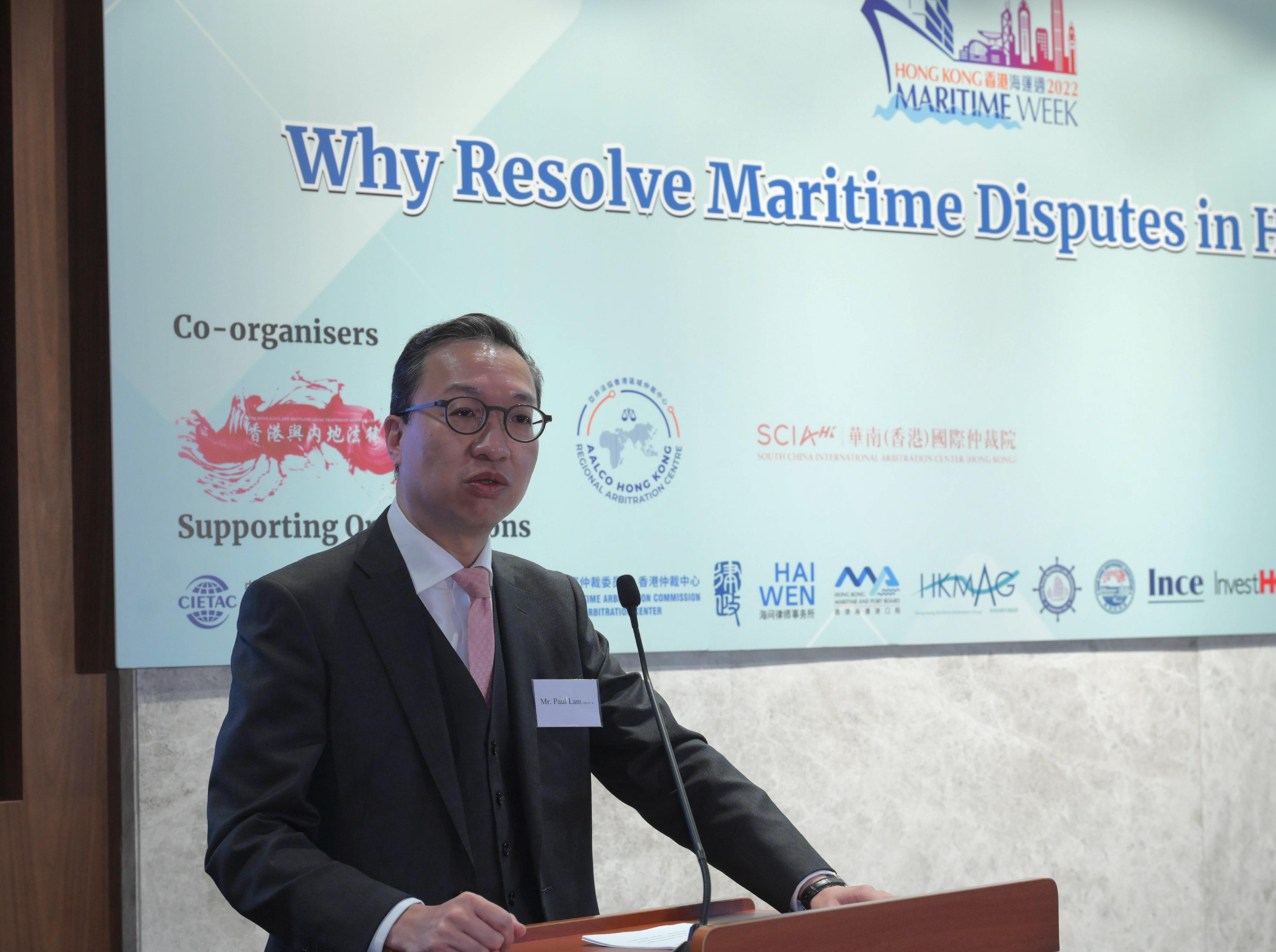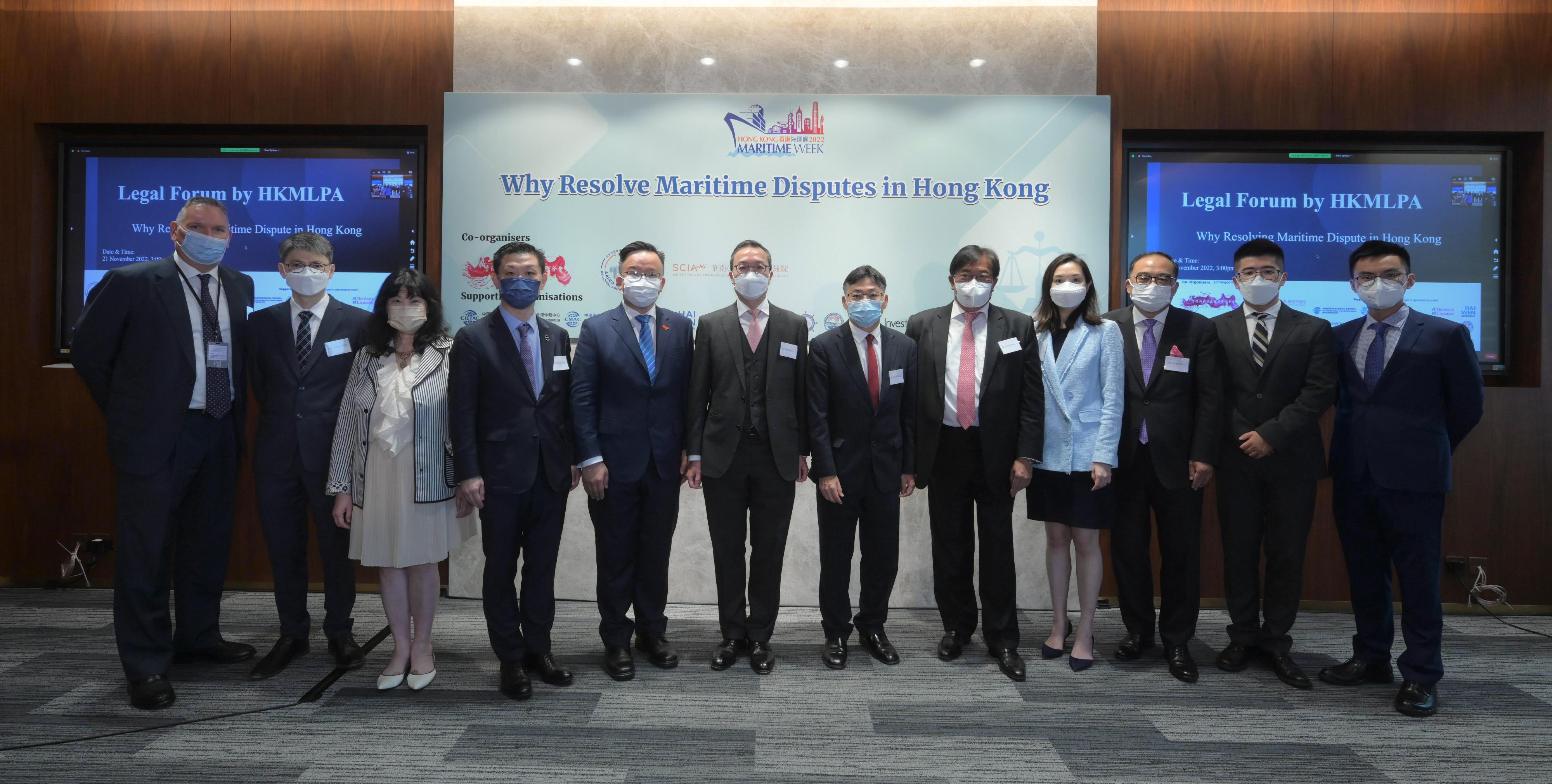Speech by SJ at Why Resolve Maritime Disputes in Hong Kong legal forum under Hong Kong Maritime Week 2022 (English only) (with photos)
******************************************************************************************
Nick (President of Hong Kong and Mainland Legal Profession Association and Director of the Asian-African Legal Consultative Organization Hong Kong Regional Arbitration Centre, Mr Nick Chan), Huen (Executive Chairman of the South China International Arbitration Center (Hong Kong), Mr Huen Wong), distinguished guests, ladies and gentlemen,
It is my pleasure to meet you all here at this first legal forum in Maritime Week 2022. Coming towards the end of 2022, the world including Hong Kong is reviving from the impact of the pandemic, with the hope that the global economy will receive a new chapter of post-pandemic recovery. With the anticipated revitalisation of cross-border trade, unfortunately an increase in contractual and business-related disputes is also to be expected. This is where dispute resolution, including arbitration, comes into play.
Maritime dealings are very often international in nature and involve multinational parties. So that first question that one would always ask is "why arbitrate?" And then the next question will be, which is also what today's forum aims to address, "why arbitrate in Hong Kong?" In other words, what makes Hong Kong so special in attracting parties to choose Hong Kong as a seat of arbitration?
Inherent advantages and international status
Being one of the busiest and most efficient ports in the world, Hong Kong is geographically well positioned to serve the global maritime industry with its strategic location at the heart of the Asia-Pacific region. As part of the Guangdong-Hong Kong-Macao Greater Bay Area, an important port cluster where three of the top 10 ports in the world, namely Shenzhen, Guangzhou and Hong Kong, are located, Hong Kong has maintained its inherent advantage as a gateway for maritime trade between the Mainland and the rest of the world.
Just as how Hong Kong developed from a fishing village into an international maritime centre, it took years of continuous efforts for Hong Kong to develop its contemporary arbitration landscape and gain its fame as a leading international legal and dispute resolution service centre, serving parties from around the world.
Since 2015, Hong Kong has become among the top five preferred seats for arbitration globally, according to the International Arbitration Surveys conducted by Queen Mary University of London. In the most recent 2021 International Arbitration Survey, Hong Kong was ranked the third most popular seat for arbitration.
Turning to maritime arbitration, the Baltic and International Maritime Council (BIMCO) officially included Hong Kong as one of the four arbitration venues under the BIMCO Law and Arbitration Clause in 2020 (Note 1).
While London remains to be the most preferred jurisdiction for international maritime arbitration in recent years, Hong Kong has been a very strong contender in this respect (Note 2). In 2021, the Hong Kong International Arbitration Centre (HKIAC) handled 514 new cases, with 17 per cent thereof involving maritime disputes (Note 3). With China being ranked as the biggest shipowning nation globally as at November 2021 (Note 4) and its active worldwide influence in the maritime industry, Hong Kong will certainly be provided with more opportunities in developing its maritime arbitration services given its unique connections with the Mainland.
With all the above international elements and recognition, one should perhaps look at the credentials possessed by Hong Kong which allow it to offer full-fledged and quality arbitration services to the maritime industry, no matter where you are.
Policy support - national level
Talking about the fundamentals, policy support is no doubt a determining factor in providing a favourable environment for the development of arbitration services in Hong Kong. At the 20th National Congress of the Communist Party of China, the policy of "one country, two systems" is valued as a great innovation of socialism with Chinese characteristics. With this policy being set to be adhered to in the long run, Hong Kong will be fully supported by the Central People's Government in maintaining its common law system as one of its distinctive advantages. This is also emphasised by President Xi Jinping in his speech in celebration of the 25th anniversary of Hong Kong's return to the motherland on July 1 this year.
As announced in the 2022 Policy Address, the 14th Five-Year Plan supported the development of the "eight centres" in Hong Kong. With "international shipping centre" and also "centre for international legal and dispute resolution services in the Asia-Pacific Region" both on the list, the development of maritime arbitration is certainly expected to jump onto the bandwagon and will aptly fit in as a measure with combined effect, allowing Hong Kong to fully capitalise on the above intended roles.
Being the only common law jurisdiction within China, Hong Kong's unique advantages under "one country, two systems" are salient. With the successful implementation of this principle over the years, Hong Kong stands out from its counterparts by being able to enter into a few arbitration-related arrangements on mutual legal assistance with the Mainland. For example, under the Arrangement Concerning Mutual Assistance in Court-ordered Interim Measures in Aid of Arbitral Proceedings by the Courts of the Mainland and of the HKSAR (Hong Kong Special Administrative Region) signed on April 2, 2019, Hong Kong became the first jurisdiction outside the Mainland where, as a seat of arbitration, parties to arbitral proceedings administered by designated arbitral institutions would be able to apply to the Mainland courts for interim measures, and vice versa. The Hong Kong Maritime Arbitration Group, as one of the designated arbitral institutions, specialises in resolving disputes in maritime and commercial matters with experienced shipping practitioners on its list of arbitrators.
As at October 31, 2022, Hong Kong's arbitral institutions have processed 82 applications for interim measures made to the Mainland courts (Note 5). In fact, the first application made by parties to a Hong Kong-seated arbitration under the Arrangement was a property preservation application related to a maritime dispute made to the Shanghai Maritime Court just a week after the Arrangement came into effect.
Other than the Interim Measures Arrangement, the Arrangement Concerning Mutual Enforcement of Arbitral Awards between the Mainland and the HKSAR signed in 1999 provides a simple and effective mechanism in both places or jurisdictions on reciprocal enforcement of arbitral awards. A Supplemental Arrangement signed in 2020 further refines this Arrangement and brings it more in line with the prevailing practice of international arbitration.
Policy support - local level
In the local context, the dedicated policy support of the HKSAR Government to the development of international legal and dispute resolution services also explains why Hong Kong thrives as an arbitration centre. In particular, the Government has been refining Hong Kong's legal framework for dispute resolution over the years, not only to keep it up-to-date, but also to promote access to justice.
In 2017, we clarified our arbitration law to provide expressly that third party funding of arbitration and mediation is not prohibited by the common law doctrines of maintenance and champerty. In February 2019, the relevant provisions on third party funding of arbitration came into operation, facilitating arbitration parties lacking financial means to pursue their claims with additional funding, and therefore improving access to justice. A Code of Practice has been put in place setting out the practices and standards of the third party funders in arbitration as well.
Whilst disclosure of third party funding was made in only three arbitrations (Note 6) in 2020, as at September this year 2022, there were 85 cases with disclosed third party funding. Such increase in the use of third party funding signifies the practical demand for funding options by arbitration users.
The other thing is that we have engaged in another legislative exercise earlier this year to unlock a new feature for our arbitration law. The Arbitration and Legal Practitioners Legislation (Outcome Related Fee Structures for Arbitration) (Amendment) Ordinance 2022 passed in June 2022 provides that certain outcome-related fee structures for arbitration (ORFSA) agreements are not prohibited by the common law doctrines of champerty, maintenance and barratry. With ORFSA, arbitration users and lawyers are given greater flexibility in devising fee arrangements that suit their financial and business needs.
We are working towards the full implementation of the ORFSA regime by introducing the subsidiary legislation this year to set out the detailed regulatory framework and safeguards for ORFSA, including fee caps for different types of ORFSA agreements, and clients' right to independent legal advice, etc. Further trainings and promotion are in the pipeline to familiarise the legal community and arbitration users with this newly minted regime in Hong Kong. Echoing the initiatives proposed in the 2022 Policy Address, user-friendly and practical legal guides and tools will be developed to facilitate the wider use of ORFSA in Hong Kong.
With all the supportive measures as the necessary hardware, the Government endeavours to build a strong and wide talent pool as the complementary software to make dispute resolution in Hong Kong an optimal choice for parties. As remarked in the 2022 Policy Address, the Government will be more proactive and aggressive in "competing for talents". A Maritime Services Traineeship Scheme will be launched next year to provide traineeship for young people who aspire to develop a career in maritime law, putting Hong Kong in a better place to provide high quality maritime arbitration service.
We have experts here today to share their insights on the outlook and prospect of maritime dispute resolution in Hong Kong. With Hong Kong's inherent strengths and policy support both in the regional and national levels as the core engines, I wish all those who sail with us would join me in witnessing how Hong Kong continues to uncover its potential in the development of maritime arbitration when navigating the voyage ahead. And on this note, I wish today's forum every success. Thank you very much.
Note 1: The other three venues are London, New York and Singapore
Note 2: According to statistics from Holman Fenwick Willan LLP, available at: www.hfw.com/downloads/002203-HFW-Maritime-Arbitration-in-Numbers-July-2020.pdf
Note 3: According to statistics from HKIAC, available at: www.hkiac.org/about-us/statistics
Note 4: According to statistics from VesselsValue, available at: blog.vesselsvalue.com/top-10-ship-owning-nations-regions/
Note 5: According to statistics provided by the HKIAC
Note 6: See statistics provided by the HKIAC at: www.hkiac.org/about-us/statistics
Ends/Monday, November 21, 2022
Issued at HKT 18:39
Issued at HKT 18:39
NNNN




